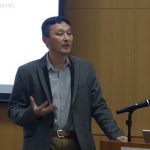【開催報告】本セミナーでは、持続可能なスマート・シティ実現を目指したデータ駆動型イノベーション政策における可能性と課題について議論を行った。特に、個人やコミュニティーへのリスクを最小限に抑えながらイノベーションの可能性を最大限に高めるには、どのようなデータ・ガバナンス・システムが適切であるか考察した。また日本、米国、中国におけるスマート・シティのイノベーション・システムが事例として紹介され、データ駆動型イノベーションのための様々なテクノロジーとサービスの開発と展開に影響を及ぼす主要な知識領域、アクター、関係機関について理解を深めた。中国の現在の状況を注意深く検討することによって、データの収集、管理、およびその使用がデータ駆動型イノベーションの創出にどのような影響を及ぼすのか、またデータ・セキュリティと一般の人々のプライバシーに関する社会的懸念にどのように対処することができるのか検討を行った。また、持続可能なスマート・シティのイノベーションを促進するためのデータ・ガバナンスに関する公共政策と制度設計の影響についても議論を行った。
In this seminar, we discussed opportunities and challenges in governing data-driven innovation for sustainable smart cities. In particular, we explored what kinds of data governance systems would be appropriate in maximizing innovation potential while minimizing risks to individual and communities. Case studies were introduced to examine the innovation systems for smart cities in Japan, the United States, and China to understand key knowledge domains, actors, and institutions that affect the development and deployment of various technologies and services for data-driven innovation. By looking at the current situation in China closely, our discussion focused on how the collection, management, and usage of data would affect the creation of data-driven innovation and how societal concerns about data security and privacy among the public can be addressed. We also discussed implications public policy and institutional design for data governance to facilitate innovation for sustainable smart cities.
◆日 時:2020年 8月25日(火)10:00~11:30
◆場 所:Zoomによるオンラインセミナー(事前登録者のメールアドレスへ前日までにZoom URLを送ります)
◆お申込:要事前登録。こちらのフォーム からお申込み下さい。(※登録フォームがうまく開けない場合はメールにてSTIG@pp.u-tokyo.ac.jp宛てにお名前とご所属をご記入の上、お申込みください)
◆言語:英語(日本語への同時通訳あり)
ご自身のスマホやタブレットに同時通訳アプリinterprefyをインストールし、ヘッドホン(必ず必要です)をつなげてお聞きください。詳細は事前登録者のメールアドレスに連絡します。
【概要】
Smart cities play a crucial role in tackling many issues concerning urban sustainability. This ranges from reducing air pollution and increasing energy efficiency to mitigating traffic congestion and maintaining resilience to natural disasters.
Data-driven innovation, including the Internet of Things, Blockchain and Artificial Intelligence, has significant potential to address these multifaceted and interdependent issues. Vast amounts of data are increasingly available from a diversity of sources through sensors and devices installed in buildings, automobiles and infrastructure across cities. Effective collection, sharing and usage of data through cooperation and collaboration among stakeholders would be critical for facilitating innovation for smart cities.
While open data access and management can contribute to innovation creation, there are many challenges that we need to address while promoting societal benefits. Serious concerns are particularly raised about collecting, sharing and using sensitive data. This especially concerns personal data in terms of safety, security and privacy. Furthermore, the balance between open and proprietary data should also be considered. As the speed of technological change is rapid and its evolution not entirely predictable or explainable, a widening gap is produced between technological change and institutional readiness. Additionally, sectors such as energy, housing and transportation, which until now were not always interconnected, are increasingly integrated through data in smart cities as cyber-physical systems. Institutional arrangements for data governance, therefore, need to incorporate the ability to learn from real-world use and experience and to improve performance through adaptation.
In this seminar we will discuss what kinds of data governance systems would be appropriate in maximizing innovation potential while minimizing risks to individual and communities. Our discussion will deal with how institutional arrangements for data governance influence the collection, management and usage of data in smart cities, and what impacts would be made on facilitating data-driven innovation while addressing societal challenges. Case studies in various countries including Japan and China will be introduced to examine the mechanisms and processes that promote collaboration on data, which reflect the structure of motivations and incentives that would be specific to local contexts. Implications for public policy and institutional design will be explored to facilitate data-driven innovation while addressing concerns about safety, security, and privacy in sustainable smart cities.
【講師】鎗目 雅 先生/香港科技大学准教授
http://yarime.net/
https://ppol.ust.hk/ppl/faculty/prof_masaru_yarime
◆YARIME Masaru, Associate Professor, Division of Public Policy, The Hong Kong University of Science and Technology; Honorary Associate Professor, Department of Science, Technology, Engineering and Public Policy, University College London; Visiting Associate Professor, Graduate School of Public Policy, The University of Tokyo

——————–
お問い合わせ:
東京大学 科学技術イノベーション政策における「政策のための科学」教育・研究ユニット
STIG事務局(STIG@pp.u-tokyo.ac.jp)